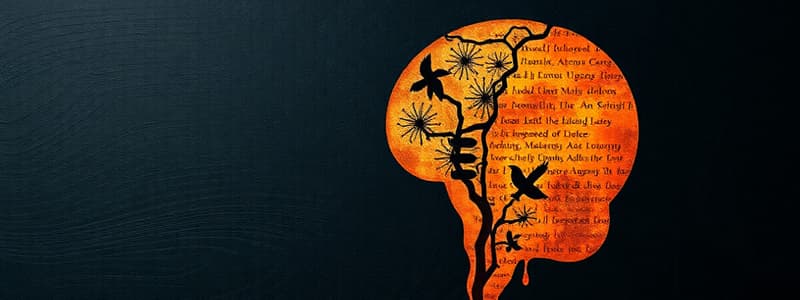Podcast
Questions and Answers
Which of the following best describes the role of philosophy in relation to truth?
Which of the following best describes the role of philosophy in relation to truth?
- It aims to verify truths through scientific experiments.
- It focuses on empirical evidence alone.
- It seeks to discover universal truths by examining norms. (correct)
- It solely relies on personal beliefs and cultural traditions.
What is the primary focus of epistemology within philosophy?
What is the primary focus of epistemology within philosophy?
- The investigation of moral principles.
- The exploration of reality and its principles.
- The evaluation of art and beauty.
- The study of the nature and theory of knowledge. (correct)
Which philosophical branch deals with the determination of right and wrong?
Which philosophical branch deals with the determination of right and wrong?
- Ethics (correct)
- Epistemology
- Social Philosophy
- Metaphysics
How does philosophy primarily differ from the sciences?
How does philosophy primarily differ from the sciences?
Which philosophical branch asks questions about the best form of government?
Which philosophical branch asks questions about the best form of government?
Why might certain cultures not be considered philosophical in the traditional sense?
Why might certain cultures not be considered philosophical in the traditional sense?
What does the branch of logic in philosophy primarily investigate?
What does the branch of logic in philosophy primarily investigate?
Which of the following centers is NOT identified as a major center of philosophy historically?
Which of the following centers is NOT identified as a major center of philosophy historically?
Flashcards
What is Philosophy?
What is Philosophy?
The examination of fundamental concepts and principles underlying human experience, reality, knowledge, morality, and art. It seeks to uncover the underlying truths and structures of existence.
What is Metaphysics?
What is Metaphysics?
A branch of philosophy that investigates the nature of reality, including existence, time, space, and causality. It asks what is truly real and how we can determine the difference between reality and illusion.
What is Epistemology?
What is Epistemology?
A branch of philosophy that explores the nature and limits of knowledge. It examines how we acquire knowledge, the reliability of our senses, and the role of reason in understanding the world.
What is Ethics?
What is Ethics?
Signup and view all the flashcards
What is Social and Political Philosophy?
What is Social and Political Philosophy?
Signup and view all the flashcards
What is Esthetics?
What is Esthetics?
Signup and view all the flashcards
What is Logic?
What is Logic?
Signup and view all the flashcards
What is Philosophy of Religion?
What is Philosophy of Religion?
Signup and view all the flashcards
Study Notes
What Philosophy Does
- Seeks universal, unchanging principles in human life, nature, and history.
- Is normative, seeking truth.
- Identifies principles underlying art, morality, religion, and reality.
Major Branches of Philosophy
- Metaphysics: Investigates the nature of reality; explores what is real and the principles to determine reality vs. illusion.
- Epistemology: Investigates knowledge; questions how we know what we know, the reliability of senses, and the mind as a knowledge source.
- Ethics: Determines principles of conduct; explores how to distinguish right from wrong.
- Social and Political Philosophy: Reflects on the state's nature and function; considers ideal government forms and state-citizen relationships.
- Aesthetics: Reflects on the nature of art and beauty; investigates what constitutes art and beauty.
- Logic: Establishes cause-and-effect relationships; explores logical reasoning and fallacies.
Philosophy vs. Other Disciplines
- Difference from Science: Does not discover new facts; reflects on existing facts; is normative (decides right and wrong).
- Difference from Religion: Based on facts, evidence, and rational reasoning; while religion combines faith, ritual, and philosophy attempts to explain, criticize, justify, and systematize reality, including religious beliefs.
Philosophy Across the Globe
- Three major philosophical centers emerged independently around 600 BC: Greek/Western, Indian, and Chinese.
- Cultures relying solely on tradition (e.g., some in Eastern Europe, the Middle East, and Sub-Saharan Africa) are not considered philosophical.
- The distinction between philosophical and non-philosophical cultures is problematic; it raises questions about who defines rational vs. irrational thought.
Studying That Suits You
Use AI to generate personalized quizzes and flashcards to suit your learning preferences.




